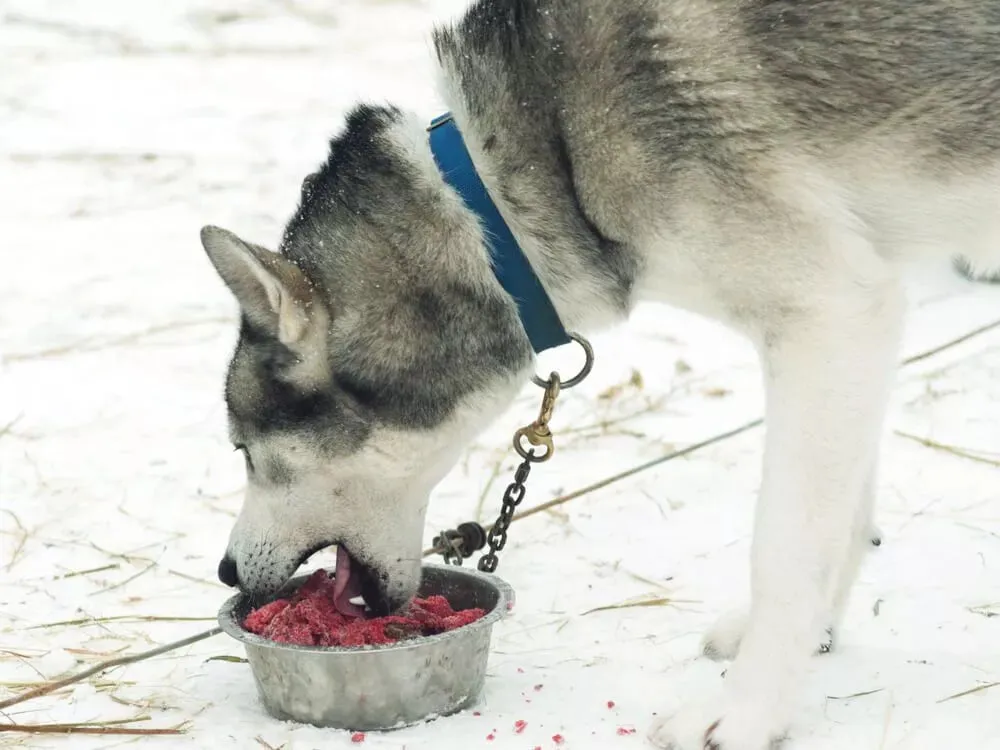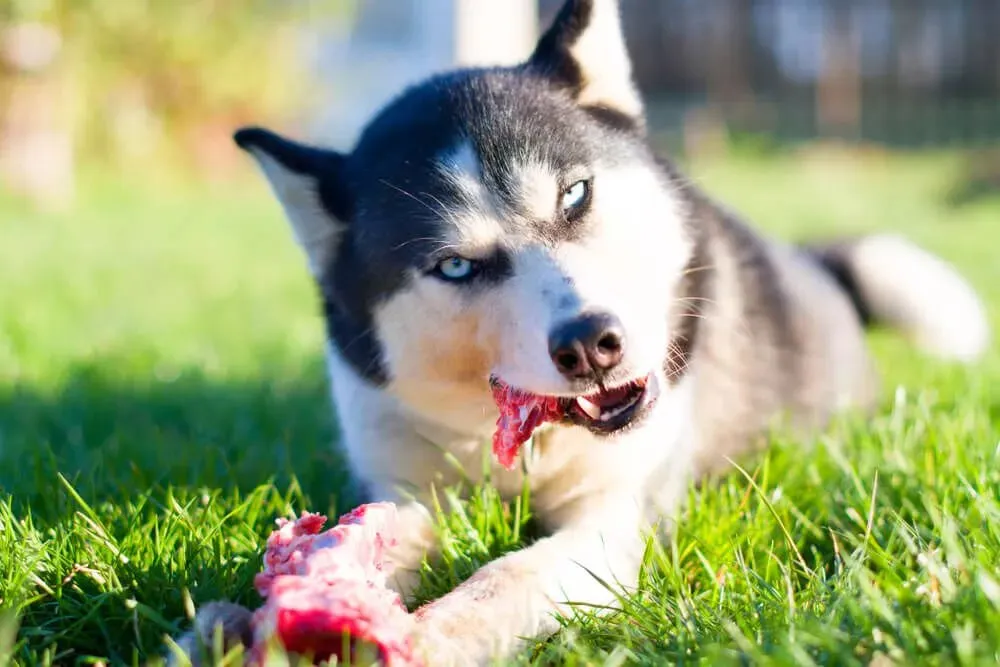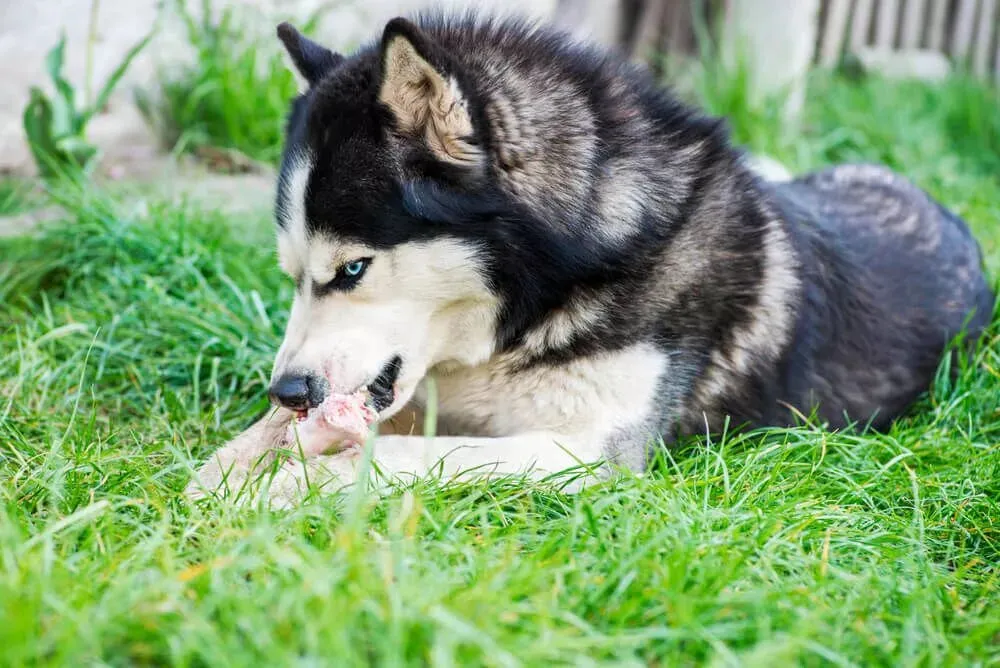The debate around feeding raw meat-based diets (RMBDs) to dogs, particularly active breeds like Huskies, has gained significant traction over the last decade. Many Husky owners are drawn to raw feeding due to their breed’s lineage as working dogs and their innate hunting instincts. The appeal often stems from a belief in enhanced health benefits and a desire to mimic the diets of wild canids. However, it’s crucial to remember that Huskies are domesticated animals, genetically distinct from their wild ancestors like wolves, having evolved over thousands of years alongside humans. This distinction raises important questions: Is feeding raw meat appropriate for Huskies, and what are the potential benefits and risks involved? For a broader understanding of canine dietary needs, you might find our article on what can dogs eat and not eat helpful.
The Allure of a Raw Meat Diet for Huskies
Raw meat-based diets typically feature a higher concentration of protein and fat, with comparatively lower levels of carbohydrates and fiber. This nutritional profile offers several perceived advantages for Huskies:
- Muscle Mass and Energy: A high-protein diet is instrumental in maintaining robust muscle mass, providing sustained energy for an active Husky lifestyle, and contributing to a healthy, lustrous coat.
- Allergen Management: RMBDs allow for easy exclusion of certain protein sources, and they are often free from grains, pulses, and legumes. This can be particularly beneficial for Huskies with known food allergies or sensitive digestive systems.
- Dental Health: The natural act of chewing, biting, and tearing raw meat and bones can help clean teeth, potentially reducing the accumulation of plaque and tartar and thus improving overall dental hygiene.
- Satiety and Weight Management: Diets rich in protein and low in carbohydrates generally have a low glycemic index, which can enhance satiety, making dogs feel fuller for longer. This aspect can be valuable for managing weight and reducing the incidence of obesity in Huskies.
Navigating the Risks: Is Raw Meat Truly Safe for Your Husky?
Despite the perceived benefits, feeding a raw meat diet to Huskies comes with significant safety concerns that owners must consider. The US Food and Drug Administration (FDA) and the American Veterinary Medical Association (AVMA) have both issued warnings regarding the dangers associated with raw meat diets for pets, primarily due to bacterial contamination.
Nutritional Imbalances and Deficiencies
 *Pet owners may struggle to ensure complete nutrition when preparing homemade raw diets.*
*Pet owners may struggle to ensure complete nutrition when preparing homemade raw diets.*
Achieving a nutritionally complete and balanced diet is often challenging for pet owners, especially with homemade raw preparations. Both commercial and home-prepared raw diets frequently present nutritional problems, with common issues including imbalances in calcium and phosphorus, as well as specific vitamin deficiencies. This is particularly true for homemade diets, where owners might lack access to precise nutritional guidance. Furthermore, different life stages—such as growing puppies, senior dogs, or those with specific illnesses—have unique nutritional requirements that are difficult to meet without expert formulation. Imbalances in essential minerals like calcium and phosphorus can be detrimental to developing puppies, while diets low in fiber can lead to constipation and other digestive issues.
The Dangers of Bones
While bones can offer essential mental enrichment, encourage natural chewing behaviors, reduce boredom, and contribute to dental health, feeding them raw also carries significant risks. Bones can lead to broken teeth, cause dangerous obstructions in the esophagus or intestines, and contribute to severe constipation.
Parasitic Contamination
Raw meat can harbor various parasites, presenting a primary source of exposure for dogs to intestinal parasites such as roundworms and tapeworms. These food-derived parasites can also be transmitted from dogs to farm animals and even to humans. If you choose to feed a raw diet, it is absolutely essential to ensure your Husky has an up-to-date parasite treatment protocol and to practice rigorous hygiene when handling your dog’s feces. The risks associated with such contamination highlight why understanding what can happen if my dog eats poop is crucial for pet owners.
Bacterial Hazards
Raw meat is a known host for numerous pathogens, including E. coli, Salmonella, Campylobacter, and Listeria. Meats that have undergone processing – for instance, commercially packaged raw meat versus whole animal carcasses, or processed forms like burgers and sausages – often exhibit higher levels of bacterial contamination. This significantly elevates the risk of infection and gastrointestinal upset in dogs, potentially leading to vomiting, diarrhea, and abdominal pain. Salmonella can cause severe illness, especially in very young, elderly, pregnant, or immunocompromised pets. Extreme caution is warranted when considering a raw meat-based diet for dogs with compromised immune systems or those receiving medications that affect immunity, such as chemotherapy drugs for cancer treatment. Further information regarding bacterial contamination hazards in raw meat can be found in a review article published in the Journal of Small Animal Practice (JSAP).
Risks to Human Health
 *Pets consuming raw food diets can shed harmful bacteria, posing a risk to household members.*
*Pets consuming raw food diets can shed harmful bacteria, posing a risk to household members.*
Dog owners and other individuals in the household can contract harmful bacteria through direct handling of raw meat-based diets and indirectly through contact with their pets’ stools. Studies have shown that pets on raw food diets can carry and shed harmful bacteria, and there is growing concern about the increased prevalence of antibiotic-resistant bacteria in these animals. Individuals with compromised immune systems—including young children, elderly people, pregnant individuals, and those with specific illnesses or on certain medications—are at a particularly elevated risk.
What Raw Meats Can Huskies Eat (with Caution)?
If you decide to feed your Husky a raw diet despite the outlined risks, certain types of raw meat can be included, always with extreme caution and strict hygiene. A raw diet might incorporate muscle meat, organ meat, bones, and raw eggs. These diets often feature a blend of different animal proteins, such as chicken, beef, lamb, turkey, venison, and even certain types of seafood.
 *Raw pork, if fed, requires extreme caution due to higher parasite levels compared to other meats.*
*Raw pork, if fed, requires extreme caution due to higher parasite levels compared to other meats.*
- Lean Proteins: Chicken, turkey, and other white meats are typically lean protein sources, lower in fat, and commonly found in commercial raw dog foods.
- Higher Fat Meats: Beef, lamb, and venison generally contain higher levels of dietary fats. These can help sustain a Husky’s energy levels and provide essential fatty acids, such as omega-6.
- Raw Pork: This meat often carries higher levels of parasites and worms compared to other meats. Therefore, extreme caution must be exercised if considering feeding raw pork.
- Processed Meats: Processed meats such like ham, sausages, and bacon are strongly discouraged. Their high fat and salt content can be detrimental to your Husky’s health and may lead to digestive problems. For more insights on what not to feed your dog, especially breeds with specific sensitivities, you can read about what french bulldogs can’t eat.
- Raw Fish and Seafood: These can contain high levels of harmful bacteria. If fed, they should only be offered fresh, never after being frozen and then defrosted, as freezing does not eliminate all bacteria. Additionally, be aware of what human meat should you never feed your dog.
The Importance of a Balanced Diet
The question of whether to feed your Husky a raw meat-based diet does not have a simple black-and-white answer. The paramount concern is to ensure your dog receives a nutritionally well-balanced diet that provides all the necessary requirements, vitamins, and minerals to maintain optimal health and fitness. Both raw and cooked diets can be nutritionally deficient if not properly formulated, meaning it’s inaccurate to categorize all raw diets as “bad” and all cooked diets as “good.”
However, there is increasing evidence suggesting that feeding raw meat poses health risks to both pets and their owners. The World Small Animal Veterinary Association (WSAVA), dedicated to improving the health and welfare of pets globally, released a consensus statement affirming that there is no scientific evidence demonstrating health benefits of raw meat-based diets over balanced commercial or homemade cooked diets. Ultimately, focusing on the quality of ingredients in your Husky’s food and the comprehensive nutrition it provides is more crucial than whether the meat source is raw or cooked. Prioritizing your dog’s overall well-being and seeking advice from a veterinarian are key steps in making informed dietary choices.
